South Shore School is a public PreK to 8th grade school in southeast Seattle.
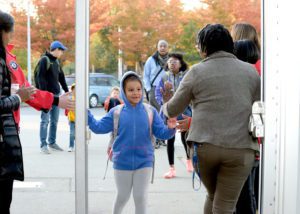
The LEV partnership with the Opportunities for Education (OFE) Foundation has prioritized the well-being of students at South Shore PreK-8, a Rainier Valley Seattle Public Schools Choice School, over the past 14 years. Innovative practices implemented at South Shore have given LEV a practical model for transforming our education system at both the district and the state level.
In 2002, the partnership between OFE and Seattle Public Schools began with a pilot PreK program. This evolved to providing South Shore with a grant to support students academically as well as socially.
Read more: Setting a good example at The New School (Seattle Times, July 5, 2005)
Meet Principal Jershon Foyston
 South Shore recently experienced a change with the departure of its long-time principal, Justin Hendrickson. New Principal Jershon Foyston has served in Seattle Public Schools (SPS) for over 7 years. He was named interim principal in Fall 2024 and assumed the permanent role in Spring 2025. Prior to becoming South Shore’s principal, Mr. Foyston served as an assistant principal at a local middle school. He has experience in both Special Education and Behavior Intervention. Principal Foyston is dedicated to continuing to partner with LEV and OFE to support South Shore students.
South Shore recently experienced a change with the departure of its long-time principal, Justin Hendrickson. New Principal Jershon Foyston has served in Seattle Public Schools (SPS) for over 7 years. He was named interim principal in Fall 2024 and assumed the permanent role in Spring 2025. Prior to becoming South Shore’s principal, Mr. Foyston served as an assistant principal at a local middle school. He has experience in both Special Education and Behavior Intervention. Principal Foyston is dedicated to continuing to partner with LEV and OFE to support South Shore students.
South Shore is one of the most diverse schools in both Seattle Public Schools and Washington state
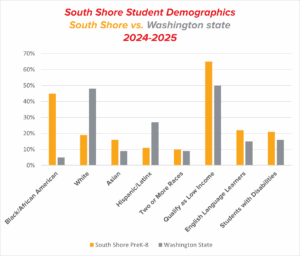 45% of its students are Black/African American, 16% Asian, 19% White, 11% Hispanic/Latinx, 10% Two or more races. 22% of South Shore Students are English Language Learners. 65% qualify as low income. 21% are students with disabilities.
45% of its students are Black/African American, 16% Asian, 19% White, 11% Hispanic/Latinx, 10% Two or more races. 22% of South Shore Students are English Language Learners. 65% qualify as low income. 21% are students with disabilities.
PreK
In the area of high-quality Early Childhood Education, LEV has supported the PreK program at South Shore since 2011, and the South Shore pilot influenced a successful initiative to bring PreK to all Seattle district schools beginning in 2014. The program continues to have strong outcomes. Per the OSPI Report Card, in 2024-2025, 89% of South Shore kindergarten students entered school kindergarten-ready, compared to just 68% of students meeting that measure across the district. Considering that 90% of South Shore kindergarten students attended preschool at South Shore, the PreK program is credited for kindergarten readiness.
Mental Health Support
Aligned with LEV’s advocacy for supportive, safe schools and trauma-informed practice, LEV partially funds a Wellness Team that provides students with reliable and consistent access to mental health services. A full-time clinical specialist from Seneca Family of Agencies is available on-site to children experiencing trauma in their lives in the forms of community violence, housing instability, and family trauma. The partnership also allows for a behavior interventionist to work with students on strategies for expressing themselves in a safe way. The team also helps teachers effectively support students with behavioral issues and, as a result, the out-of-school discipline rate has dropped dramatically as more teachers feel equipped to keep students in class. This has also impacted the use of isolation and restraint. South Shore has all but eliminated the practice and will only use restraint if the student or someone else is in imminent danger.
Multi-Tiered System of Supports (MTSS)
The Opportunities for Education Foundation Grant supports the MTSS program by providing funding for members of the MTSS team. The MTSS team meets regularly to discuss student needs and to determine the support required to allow for student success. The Multi-Tiered System of Supports program provides students with support in:
- Academics: When it is determined that students are struggling, the team uses flexible scheduling to meet in small groups with students to provide additional academic support.
- Attendance: The MTSS team looks closely at student attendance and uses existing relationships with families to determine the root cause of absences. Based on family need, the school provides support, scheduling changes, as well as mental health counseling where needed.
- Identification of Students Who Need Additional Supports: The MTSS program allowed staff to identify students who need additional supports early on. This allowed them to develop an individualized program that meets student needs.
- Financial Support and Food Distribution: If it is determined that families are struggling financially, the school can offer some financial support. The school has also developed a vibrant food distribution program for families with food insecurity. South Shore also partners with many community organizations that can provide financial support to families in need.
Learn more: Podcast – Rachel Madding on Multi-Tiered System of Supports
Social-Emotional Learning (SEL)
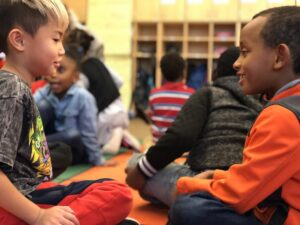
South Shore adopted the practice of teaching SEL (Social-Emotional Learning) to its students early on as well as developing a school culture rooted in social-emotional learning. In the beginning, the grant funds allowed for trained counselors to provide SEL instruction to students in small groups as well as in the classroom. After students returned to school following the pandemic, counselors trained teachers to provide an integrated SEL curriculum to students in the classroom.
Physical Well-Being
Because the OFE/LEV grant’s focus is the overall well-being of students, the partnership helps support a school nurse in the school. This became vitally important during the pandemic where the school nurse provided testing to students and staff showing signs and symptoms. The school nurse also partnered with community organizations to provide an in-house vaccination clinic for students, staff, and community members.
Literacy
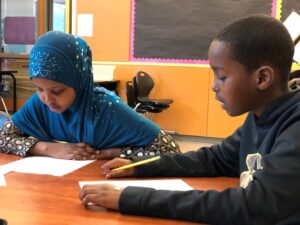
The role of the literacy coach is to work with teachers, instructional assistants, and students to increase competency in English Language Arts. In the Spring of 2018, the school implemented the SIPPS (Systematic Instruction in Phoneme Awareness, Phonics, and Sight Words) program for its K-5 students and, beginning Fall 2019, fully implemented it throughout the school. The goal of the SIPPS program is to target the specific needs of each student and work to increase fluency through phonemic instruction, spelling, and sight word recognition. Students break apart into groups based on skill level and work with trained instructional assistants to increase their skills. Students are periodically tested and instruction is modified to their new level. The Literacy Coach closely monitors students to ensure they are progressing through the program. The school also contracts with TIPS (Tutors Impacting Public Schools) to provide support for students as they learn to read.
Professional Development
The school has focused on improving school culture through professional development, partnering with TNTP (formerly The New Teacher Project) in order to develop a system of non-evaluative observation and feedback. School leaders are developing strategies to improve academic practices in the classroom while using PLCs (Professional Learning Communities) to analyze academic performance and modify teaching practices to best support student needs.
Childcare
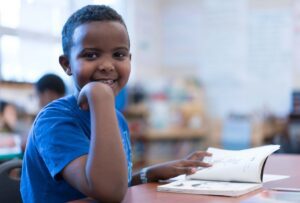
With funds from the OFE grant, South Shore has been able to offer scholarships to families for after-school care provided by Kids Co. The on-site childcare program gives students the opportunity to do homework in a supported environment and takes pressure off older siblings needing to care for their young brothers or sisters.
Speaking Their Truth
Grant funds began supporting South Shore’s partnership with Speak with Purpose in 2024. Speak with Purpose works with students to use their voice to share their passions. In developing their public speaking skills, students also work on literacy and reading strategies. The mission of Speak With Purpose is to “Provide public speaking that empowers youth to boldly speak their truth.”
The South Shore staff and administration feel strongly that students belong in the classroom, supported by adults who understand their needs. They continue to use their voices to advocate for students and families. Both administration and staff have volunteered to share their stories with the community and lawmakers to advocate for change.
Love what we do? Support our work
Want to find out the latest in education news in Washington? Subscribe to our newsletter
Want to learn more about League of Education Voters? Find out here